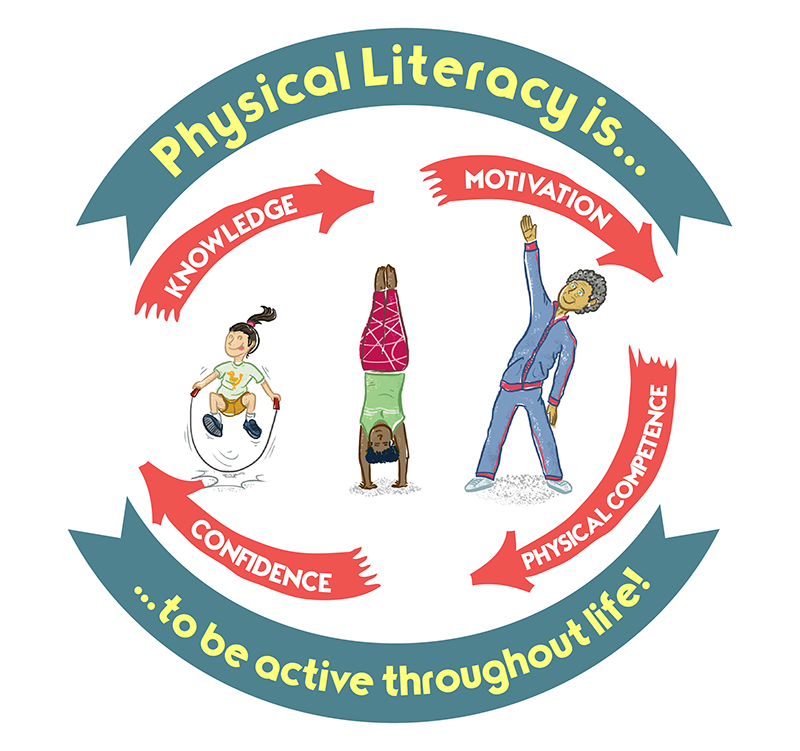Physical literacy and democratic citizenship
Living Democracy » Principals » ACTIVE SCHOOL » Awareness » Physical literacy and democratic citizenshipWe take the view that physical activity is to the body what reading is to the mind.
It follows that individuals have the fundamental right not only to become literate in reading and writing but also physically literate. Physical literacy is a term that refers on the one hand to physical competence, motivation, confidence and knowledge, and on the other hand to the appreciation of, as well as assuming the responsibility for, one’s purposeful physical activities throughout a person’s lifespan. In other words, physical literacy leads to a fuller understanding and appreciation of physical activity, and to a personal commitment to an ongoing, integral part of one’s life.
The implications of teaching physical literacy to children and adolescents lead to the core of EDC/HRE. As stated above, physical literacy emphasizes the individual responsibility for one’s health and well-being. The key concept of responsibility makes us aware of the consequences of our decisions and choices, whether we recognize them or not. Understanding physical literacy means reflecting on our habits and questioning them if the need arises. In a democratic society, citizens should share an attitude of moral responsibility, which involves “the adoption of a reflective and thoughtful approach towards one’s actions and the possible consequences of those actions.” (Competences For Democratic Culture, p. 42 f.,https://www.coe.int/en/web/education/competences-for-democratic-culture). Therefore, acquiring physical literacy is akin to learning about democratic citizenship in a highly practical and personally meaningful way.
However, learning through experience requires reflection if young people are to understand what they are doing in terms of physical literacy or democratic citizenship. Arriving on insights through personal experience does not take place automatically, but rather by learning through thinking about what we are doing. As in task-based learning (see education for democracy, p. 123), students are dealing with challenges or problems, and in order to draw conclusions from their efforts, they need the opportunity to share their experiences and reflect on them under guidance by a teacher. Moreover, a teacher should make the students aware of their personal responsibility for their well-being, and that personal responsibility is the key to democratic citizenship. When coordinating physical activities at your school, you should therefore make your staff aware that physical activities include thinking about what you are doing.

Physical literacy is neither synonymous with, nor confined to, the subject of physical education. It is rather one of its objectives as physical education around the world aims to educate for lifelong engagement in physical activity for health. Additionally, it can be acquired in different ways, including encouragement, support by parents, friends, teachers, practitioners or through an individual’s own will and decisions. Physical literacy is not a school subject. In school settings, principals and teachers plan, guide and support a learner’s involvement in physical activities that are purposeful, rewarding and meaningful. Yet, as in the case of literacy, which “not only involves competency in reading and writing, but goes beyond to include the critical and effective use of these skills in people’s lives”, physical literacy includes other aspects, such as:
- “sensitive perception in ‘reading’ all aspects of the physical environment, anticipating movement needs or possibilities and responding appropriately to these with intelligence and imagination
- a well-established sense of self, as embodied in the world. Together with an articulate interaction with the environment, it engenders positive self-esteem and self-confidence.
- sensitivity to, and awareness of, embodied capability, leading to fluent self- expression through non-verbal communication and to perceptive and empathetic interaction with others.
- the ability to identify and articulate the essential qualities that influence the effectiveness of movement performance, and an understanding of the principles of embodied health, with respect to fundamental aspects such as exercise, sleep and nutrition.”
Margaret Whitehead, ICSSPE Bulletin number 65 I October 2013, p. 29 f.
https://www.icsspe.org/sites/default/files/bulletin65_0.pdf

